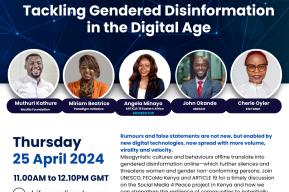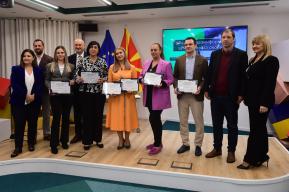News
Media and Information Literacy for Critical Thinking

Martins Akpan, an educator and the founder of Teen Resources Center, is a practitioner of Media and Information Literacy in Nigeria. His main work is to empower the youth with the capacity of critical thinking and to provide quality information on traditional and social media platforms.
According to Mr. Akpan, he was exposed to Media Literacy in 2002, while working as a producer of children and educational programmes for two television stations (MITV and MCTV) in Lagos, Nigeria. In these eighteen years, he has witnessed the development of MIL curriculum worldwide and its mainstream into Nigerian society.
In the early years, he had worked with Dr. Rother Lee, a Canadian Media Literacy researcher and Frank Baker, an American Media Literacy expert and UNSECO/GAPMIL award winner to get involved in Media Literacy research and training with schools age children, tutors and administrators.
Martin’s expertise was further enhanced through UNESCO Media and Information Literacy programmes in Athabasca University Canada. His experience in the domain of media and information literacy is intertwined with the development of media and information literacy curriculum launched by UNESCO.

According to Martins, empowering people through media and information literacy (MIL) is becoming an essential prerequisite for fostering equitable access to information and knowledge and promoting free, independent and pluralistic media and information systems.
Nigeria’s media scene is one of the liveliest in Africa. State TV and hundreds of radio stations have the capacity to reach out tens of millions of viewers and audience. Moreover, along with the wide spread of mobile phones and networks, millions of Nigerians are actively on the social media platforms. This has created a serious gap in critical thinking; webbed with the challenges of fake news and hate speeches as elsewhere in the world.
Martins believes that the Media and Information Literacy Coalition of Nigeria (MILCON) founded in 2017 with UNESCO’s support can play a very vital role to address some of these challenges. The Coalition, accordingly, is created to facilitate coordination of interventions on MIL in Nigeria and promote synergy amongst stakeholders towards advocating on National Policies, integrating the MIL curriculum into schools and promoting a MIL literacy society.
Acting as an MIL educator, Mr. Akpan works directly with the pupils, students and teachers. He points out the difficulty in educating ‘critical thinking’ to them, especially for the children. The MIL games and non-formal guide produced by UNESCO Abuja have played important role in helping the educators, like Mr. Akpan, to interact better with the users. From his words, “We are happy to hear that children are showing great excitement in these materials, and they discuss specific topics around the games and the genre of films in classrooms.” As one of the students puts:
In order to reach out a greater population, MIL Clubs have been established across the country from south to north, east to west, which is a feasible way to get more students and pupils involved in the media and information literacy curriculum. He believes that MIL clubs serve as viable means and platforms for expanding civic education movement in primary and secondary schools.
The development and mainstream of Media and Information Literacy programme in Nigeria cannot be realized without the efforts from various organizations and the individual enthusiasts like Mr. Akpan. Along with the dramatic development in media and communication, momentous changes have been and being brought out to shaping and reshaping the individual lives and the society as a whole. Establishing a media and information literacy society is under the shroud of taking the collective responsibility and efforts to construct a strong bulwark of peace, and it still takes a long way to go.






